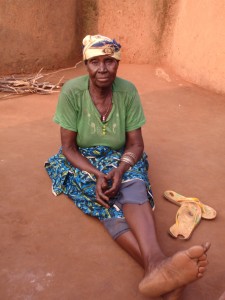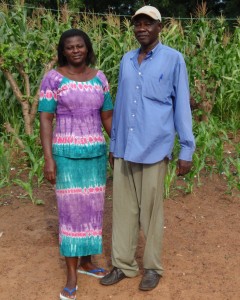This is the fourth of six posts I’ll be writing about the Gambaga witch camps. Â You can find additional posts below

Magajia Dahamat Seidu
Magajia Dahamat Seidu is an admitted killer.  She murdered a child in her village of Zeongu almost twenty years ago.  She cursed it and  it died mysteriously.  She doesn’t know why she did it.  She just did.
At least that’s what an article from last year’s Daily Graphic tells me.  Simon shows me the article in his office when I ask if there are any witches who have confessed to witchcraft.  He saves all newspaper clippings that mention the camp.  I ask him if I can talk to Seidu.  A half-hour later, I’m sitting on a tiny footstool, chewing nuts and staring into her tiny wrinkled face and pooling brown eyes.
Seidu tells me, in short measured sentences, that, yes, she is a witch, and, yes, she did curse a child to death, and, no, she doesn’t know why.  “I just opened my mouth, and it spoke,†she says. The woman is not stable. She is unable to answer many of my questions, and it becomes apparent that Simon is filling in the gaps during translation.  I am a bit wary of her eyes–they are uncomfortably vacuous and constantly staring through me. I decide to cut it short after ten minutes.
“Done,†Simon says, surprised.
That night I have Simon and his wife, Evelyn, over for dinner.  I find a woman who will make me pasta and I order a six-pack of Guinness.  Simon shows up five minutes early in his best shirt, a faded Chelsea soccer jersey.  He drinks the beer with a disquieting fervor, not even waiting for the foam to recede.  Evelyn tells me that she has “small malaria†and asks if she can have some of my medication (I keep a prescription of malarone in my bag when I leave Accra).
I don’t eat any of my chicken, it tastes horrible, so they inhale it together, including the bones.  Suddenly I realize that I have spent the last three days looking for the answers to my questions about the Gambaga witch camp, when the best source was always sitting in front of me.  “You know, you must have one of the strangest job titles in the world,†I joke with Simon. “How did you ever become the manager of a witch camp? â€

Simon and Evelyn Ngote
Simon’s English is very good, although he has no formal education, and he unwinds a long, tightly constricted narrative about his past. He is from a small village, close to Gambaga, and has lived in the region most of his life.  He became involved in social work in the eighties, primarily assisting victims of river blindness, an insect-borne malady that affects the aged in rural areas.  One job led to another, and most were affiliated with the Presbyterian Church.  In 1994, he was offered his current position in Gambaga.
Simon cares more about the witches of Gambaga than anyone else I have met.  “I want them to live a decent life,†he tells me.  “I don’t think of them as witches but social outcasts.â€
“But, do you believe that they are truly witches?†I ask.
“My wife thinks I’m crazy,” he whispers, smiling at Evelyn, whose English is very poor, “but I don’t think all of the allegations are true.† He delivers the line as if he’s confessing an infidelity, a state-secret or a radical conspiracy theory.  The shocking thing is that in northern Ghana Simon’s belief–that witchcraft may not exist–is borderline sacrilege.  In fact, Simon tells me that if he attempted to debunk witchcraft in rural villages his efforts would not only be fruitless, but could damage him professionally.  “I would lose my credibility, people would think I was a crazy man,†he says.
Visit the Gambaga archive for the first three posts in this series or check out the photo gallery for more images from the witch camps of North Ghana.
“although he has no formal education”: this is not true. He has a degree in agriculture and attended some catholic college or so.
Evelyns English is although very good, by the way. I had fluent conversations without any problems with her.
Further: Be careful if you quote or write from an emic perspective. There are people who will read your blog and do believe in WC. Maybe someone googles Gambaga for bringing away his aunty.
Just be careful, if you write in public “Magajia Dahamat Seidu is an admitted killer.” Though it has some journalistic glitter. The rules and cultures of quotation are not quite clear to anybody. And you shouldn’t mention the real names of those victims of witchhunts you interview – you never know if not in some years some madman will collect the names and hunt them down believing he is supposed to kill all the “witches” in the world.